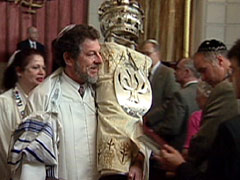In This Episode << SLIDE LEFT TO SEE ADDITIONAL SEGMENTS
Jewish High Holidays
RABBI IRWIN KULA (President, National Jewish Center for Learning and Leadership): I think one of the interesting things about Rosh Hashanah in general and about the High Holiday period is that the celebratory aspect, which is Rosh Hashanah and the celebration of the New Year, actually comes before the atonement focus, which is Yom Kippur. So you come out of Rosh Hashanah and say, “New Year. Everything’s sweet. It’s amazing. Life is good,” and then okay, well, given that, why not check out who I am?
 Teshuva is this process over Rosh Hashanah and Yom Kippur in which we return to that place deep, deep down of who we really want to be, and so everything having to do with Rosh Hashanah and Yom Kippur, all the prayers and all the liturgical readings and all the readings from scripture and the variety of practices, whether it’s blowing a shofar, or on Yom Kippur it’s fasting and staying in the synagogue for most of the day, all of the practices are designed to help us make teshuva, return to that deepest path that we know we want to be on.
Teshuva is this process over Rosh Hashanah and Yom Kippur in which we return to that place deep, deep down of who we really want to be, and so everything having to do with Rosh Hashanah and Yom Kippur, all the prayers and all the liturgical readings and all the readings from scripture and the variety of practices, whether it’s blowing a shofar, or on Yom Kippur it’s fasting and staying in the synagogue for most of the day, all of the practices are designed to help us make teshuva, return to that deepest path that we know we want to be on.
There really are three basic questions that these 10 days invite us to think about. One is can I change as a human being? Can I really become better? And the second question is, is forgiveness possible? Can I forgive other people and can I feel forgiven? And the third question that runs through all of these days is am I accountable for my behavior?
In the central prayer of Rosh Hashanah-Yom Kippur, “Who shall live, and who shall die,” in that prayer it says on Rosh Hashanah it is written—in other words your fate, your destiny, in a sense, is written down, is inscribed—and on Yom Kippur it’s sealed.
Our behavior does affect the nature of our life. I don’t know if it affects whether we literally live or die, but it surely affects whether we live or whether we die in life.
If Rosh Hashanah and Yom Kippur work, at the end of Yom Kippur there’s a final blast. The last thing on Yom Kippur is a final long blast of the shofar, and at that moment I should feel two things exactly at the same time. One is I am really perfect and loved just the way I am, and I can do better, and to hold those two things together—I’m perfect and loved just as I am, and I can do better—is the process of teshuva working.

